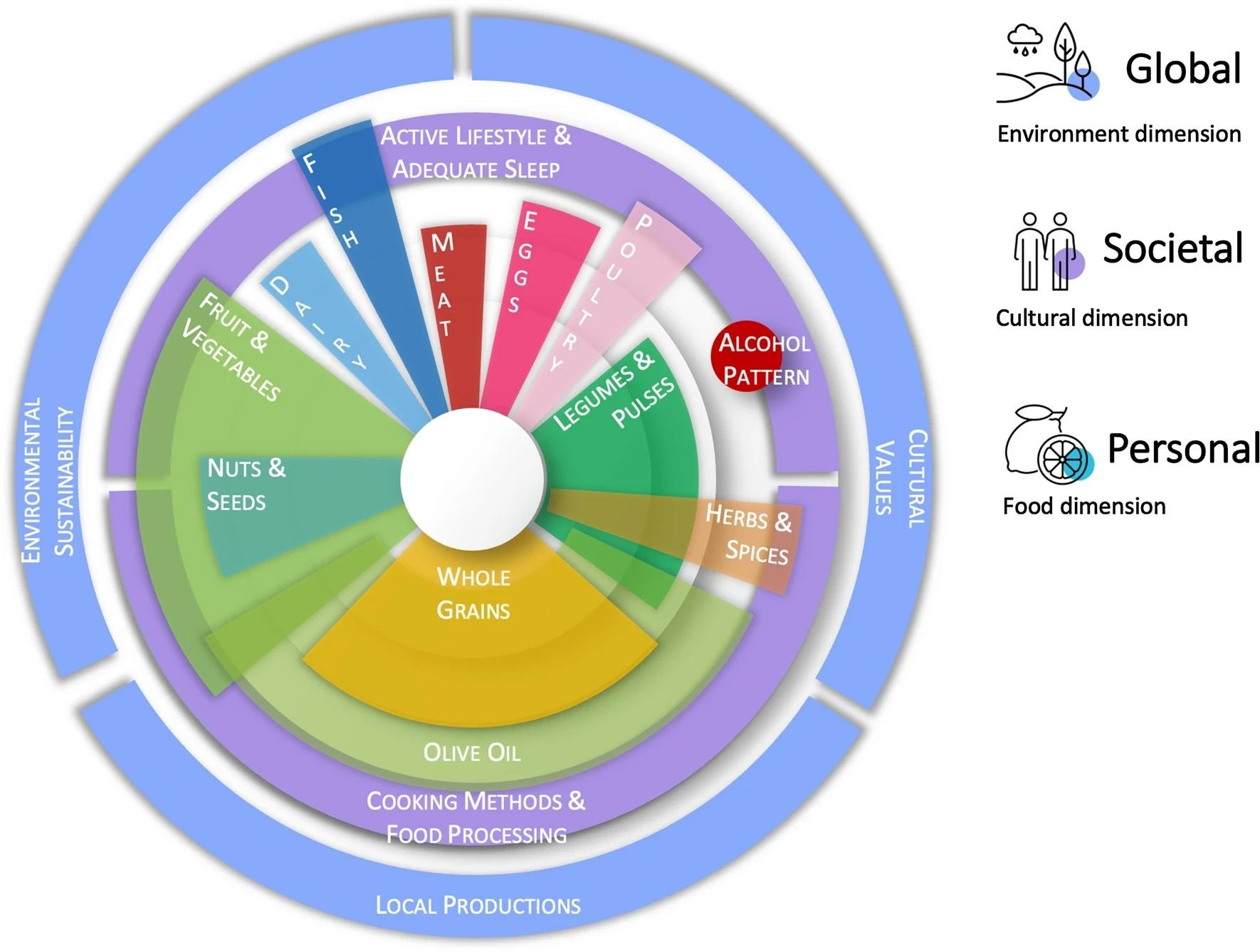The Mediterranean diet has gained immense popularity over the last decades because of its scientifically proven positive impact on human health. Many studies have been conducted to decipher this dietary pattern's health and environmental impact.
 Underrated aspects of a true Mediterranean diet: understanding traditional features for worldwide application of a “Planeterranean” diet
Underrated aspects of a true Mediterranean diet: understanding traditional features for worldwide application of a “Planeterranean” diet
Background
The Mediterranean diet was recognized as an Intangible Cultural Heritage of Humanity by UNESCO in 2020. Many studies conducted in both Mediterranean and non-Mediterranean countries have highlighted the protective efficacy of this diet against diabetes, obesity, cardiovascular disease, and even cancer.
However, a wide variety of dietary factors remained unexplored while studying adherence to this diet. Studies deciphering the health impact of a Mediterranean diet have primarily focused on the consumption of fruits and vegetables, olive oil, and cereals.
Dietary factors that remained unexplored include the consumption of whole grains, legumes, nuts, seeds, herbs and spices, eggs and dairy products, and red wine. Other unexplored factors that can significantly impact dietary adherence include cooking methods and food production, processing, and preservation.
In this article, the authors have explored important and unexplored dietary aspects to better identify and characterize the Mediterranean diet in the modern world.
Unexplored dietary components of the Mediterranean diet
Most of the methodologies used for assessing the nutritional and health benefits of the Mediterranean diet have some limitations. Dietary scores and indexes determining the nutritional content of the Mediterranean diet do not generally consider the total daily calorie intake and the proportion of macronutrients.
Dietary score- and dietary index-based classification of the Mediterranean diet cannot fully capture the cultural, behavioral, and culinary aspects characterizing the Mediterranean dietary pattern adopted by individuals living in the Mediterranean area, from its historical beginning to the southern Italian farmers in the 1960s.
Eggs
Dietary indexes assessing the level of adherence to the Mediterranean diet do not generally include egg consumption. Eggs are widely perceived as a major source of cholesterol and a risk factor for cardiovascular disease. In reality, egg is an inexpensive and nutritious source of proteins, vitamins, and minerals.
Scientific evidence indicates that egg proteins are easily digested and provide many essential amino acids. Eggs are a rich source of bioactive peptides with antioxidant and anti-inflammatory properties. In addition to cholesterol, egg fat contains phospholipids, mono- and saturated fatty acids, lutein, lecithin, choline, and a variety of vitamins and minerals.
Notably, some people may experience cardiovascular adversity from egg cholesterol due to the production of trimethylamine N-oxide (TMAO). However, egg consumption is associated with many health benefits.
Dairy products
Milk and its products, such as butter, yogurt, curd, and buttermilk, have been part of a typical diet in Mediterranean regions for at least 9,000 years. However, saturated fatty acids in dairy products have restricted their consumption over time because of the possibility of increasing low-density lipoprotein (LDL) cholesterol in the blood.
Evidence indicates that dairy product-derived saturated fatty acids can only partially increase circulating LDL cholesterol levels. In contrast, these fatty acids have many beneficial effects, including inducing high-density lipoprotein (HDL) levels, improving metabolic function, and preventing microbiota dysbiosis.
Evidence also indicates that milk and milk product consumption is associated with a lower risk of cardiovascular complications, including hypertension, as well as a lower risk of colorectal cancer.
Nuts and seeds
Certain types of nuts, such as almonds, walnuts, and pistachios, as well as seeds, such as pine seeds, flaxseeds, and pumpkin and sunflower seeds, have been part of the typical diet in Mediterranean regions for thousands of years ago.
A large pool of evidence indicates that nut consumption is associated with a lower risk of cardiometabolic diseases. However, findings of clinical trials indicate that nuts can increase LDL levels in the blood. In contrast, only a few studies have analyzed the health effects of seeds and produced mixed results.
Nutritional analysis of these energy-rich foods indicates the presence of essential fatty acids, phytochemicals with antioxidant and anti-inflammatory properties, and phytosterols with cholesterol-lowering properties.
Herbs and spices
The consumption of herbs and spices has been long documented in Mediterranean regions. These plant-derived components are used to enhance the taste, flavor, and aroma of foods. However, these components have hardly been found in any Mediterranean diet adherence score.
Scientific evidence indicates that herbs and spices can reduce the risk of non-communicable diseases. They are rich in phytochemicals with antioxidant, anti-inflammatory, anticancer, lipid-lowering, and blood pressure-lowering properties. They can improve digestion and exert neuroprotective effects.
Red wine
Moderate wine consumption is an integral part of a traditional Mediterranean Diet. However, current dietary guidelines advise excluding alcohol from the diet because of its carcinogenic and other detrimental health effects.
Many observational studies clearly indicate that moderate alcohol intake can significantly reduce the risks of cardiovascular disease and all-cause mortality. However, its impact on the risk of breast, liver, and colon cancer remains unclear.